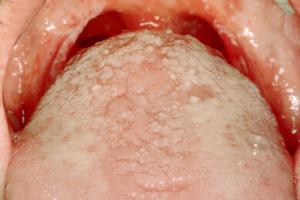Oral thrush in adults
Oral thrush is a fungal infection of the mouth. It is usually successfully treated with antifungal medication. You should speak to your GP if you develop symptoms of oral thrush.
About oral thrush
Oral thrush is caused by a group of yeasts called Candida. Most people already have spores of the fungi in their mouth. They don't usually cause any problems, but can lead to oral thrush if they multiply.
Oral thrush is not usually considered an infection that you get from other people.
Symptoms of oral thrush
Symptoms of oral thrush can include:
- white patches (plaques) in the mouth that can often be wiped off, leaving behind red areas that may bleed slightly
- loss of taste or an unpleasant taste in the mouth
- redness inside the mouth and throat
- cracks at the corners of the mouth
- a painful, burning sensation in the mouth

In some cases, the symptoms of oral thrush can make eating and drinking difficult.
If you have oral thrush your mouth is red inside and you have white patches.
When to see your GP
Speak to your pharmacist if you develop symptoms of oral thrush. Some treatments are available that can help.
If left untreated, the symptoms will often persist and your mouth will continue to feel uncomfortable. If your symptoms continue - see your GP.
In severe cases that are left untreated, there is also a risk of the infection spreading further into your body. This can be serious.
Your GP will usually be able to diagnose oral thrush by examining your mouth. Sometimes they may also recommend blood tests.
The tests will look for certain conditions linked to oral thrush, such as diabetes and nutritional deficiencies.
Causes of oral thrush
There are a number of reasons why oral thrush may happen, including:
- taking a course of antibiotics, particularly over a long period or at a high dose
- taking inhaled corticosteroid medication for asthma
- wearing dentures (false teeth), particularly if they don't fit properly
- having poor oral hygiene
- having a dry mouth, either because of a medical condition or a medication you are taking
- smoking
- having chemotherapy or radiotherapy to treat cancer
Babies, young children and elderly people are at a particularly high risk of developing oral thrush
People with conditions that can affect the immune systems or normal barriers to infection can increase the risk of developing oral thrush. The conditions include:
- diabetes
- an iron deficiency or vitamin B12 deficiency
- an underactive thyroid (hypothyroidism)
- HIV
Treatments for oral thrush
Oral thrush can usually be successfully treated with antifungal medicines. These usually come in the form of gels or liquid that you apply directly inside your mouth (topical medication).
Tablets or capsules are also sometimes used.
You can ask your pharmacist for advice.
If antibiotics or corticosteroids are thought to be causing your oral thrush, the medicine – or the way it is delivered – may need to be changed or the dosage reduced. Speak to your pharmacist or GP if you think this is an issue for you.
Preventing oral thrush
There are a number of things you can do to reduce your chances of developing oral thrush, including:
- rinsing your mouth after meals
- brushing your teeth twice a day with a toothpaste that contains fluoride, and interdental cleaning (flossing) regularly
- visiting your dentist regularly for check-ups, even if you wear dentures or have no natural teeth
- removing your dentures every night, cleaning them with paste or soap and water before soaking them in a solution of water and denture-cleaning tablets
- brushing your gums, tongue and inside your mouth with a soft brush twice a day if you wear dentures or have no or few natural teeth
- visiting your dentist if your dentures do not fit properly
- stopping smoking if you smoke
- rinsing your mouth with water and spitting it out after using a corticosteroid inhaler, and using a spacer (a plastic cylinder that attaches to the inhaler) when you take your medicine
- ensuring that any other condition you have, such as diabetes, is well controlled
If you have a condition or are receiving treatment that could put you at a high risk of developing oral thrush, your doctor may recommend taking a course of antifungal medication. This is to prevent oral thrush happening.
Other types of thrush
Thrush can also affect the vagina, skin and the head of the penis (glans).
For more information about other types of thrush, see:
More useful links
The information on this page has been adapted from original content from the NHS website.
For further information see terms and conditions.